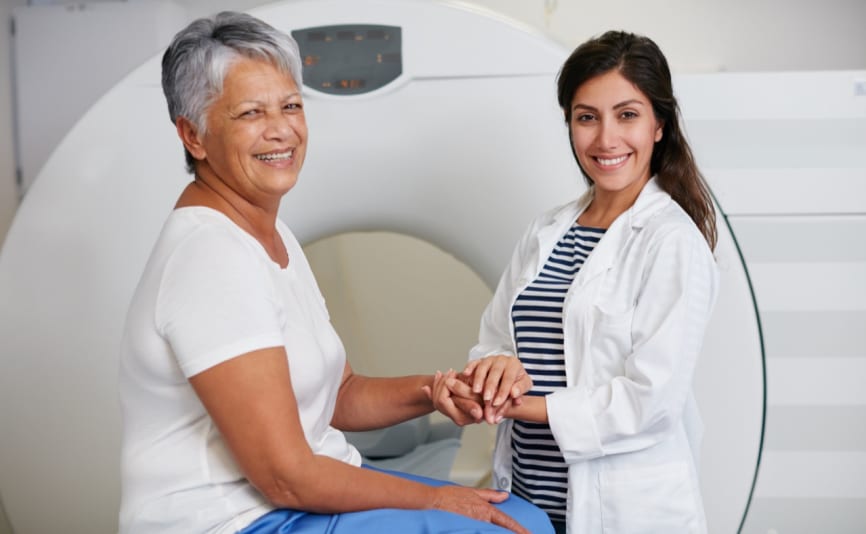Fracture Assessment CT Scan: Info & Get a Scan
Between 30-50% of adults over the age of 50 experience vertebral or spinal fractures. In fact, fractures are a lot more common than you might think.
CT scans use X-rays, but generate images in far greater detail than standard X-ray scans. This is especially useful when assessing complex fractures, such as spinal, pelvic, arm, leg, ankle or knee fractures. These types of injuries usually need specialist intervention, and CT scans can help determine the best course of treatment.
What is a fracture assessment CT scan?
A CT scan uses X-rays to generate images of the inside of your body. Usually, the scan will create several images in ‘slices,’ which can then be compiled into a 3D image, or viewed as a series of 2D images.
During the scan, you’ll normally lie on a flat bed, which moves into the doughnut-shaped CT scanner. An X-ray beam will circle around you, and detectors on the opposite side of the scanner will measure how much of the X-ray passes through different types of body tissues from different angles. This information can be used by a computer to generate detailed images.
Want to learn more about different types of CT scan? Visit our definitive guide.
Why might you need a CT scan for a bone fracture?
Sometimes, X-rays don’t provide enough information to accurately assess fractures. However, in some cases, complex fractures can cause other problems that need to be addressed and treated quickly. For example, a pelvic fracture or skull fracture could cause damage to the surrounding tissues such as blood vessels, which might cause internal bleeding.
As part of our duty of care, if we find anything urgent in your scan results that would constitute a medical emergency, we will contact your GP and advise you to visit an emergency hospital department (A&E).
What types of fracture can CT scans be used for?
There are multiple types of fracture, including complex fractures, which can be imaged using CT scans. These include:
- Foot and ankle fractures
- Wrist fractures
- Skull and facial bone fractures
- Rib fractures
- Shin and knee fractures
- Pelvic fractures
- Hip fractures
- Spinal fractures
- Hand fractures
Our CT fracture assessment service enables you to choose the area of your body that needs scanning. Our expert medical team will contact you after you’ve placed your booking, to discuss your symptoms and make sure you receive the correct scan for your needs.
This is especially important for CT scans, as they need to be medically justified to avoid unnecessary radiation exposure.
Can a CT scan miss a fracture?
Sometimes, standard X-ray scans can miss fractures, and are not commonly used to assess any damage to the surrounding tissues as a result of a fracture. This is why CT is recommended for certain types of fracture assessment, as they are less likely to miss a fracture or any associated damage.
How long does a CT fracture assessment scan take?
CT scans are one of the fastest types of medical imaging scans. Your whole body can be imaged in under a minute, which makes CT useful in emergency settings. Our CT scan appointments can take up to 30 minutes, to allow time for any paperwork, getting changed, asking questions, and administering a contrast agent where required.
What to wear for a CT scan?
Metal items such as glasses, dentures, jewellery, watches, belts, bra underwires, and even some hearing aids can interfere with the quality of CT scan images. You’ll therefore be asked to remove these items where possible, and might even be asked to change into a medical gown for your procedure.
We generally recommend wearing soft and comfortable clothing, as you may be able to wear your own clothes for the scan if they will not cause any interference.
How much does a CT scan for fracture assessment cost?
Our CT scan prices start from £359, and include a full package of care, not just your scan. The price you pay includes:
- A pre-scan consultation with a dedicated expert clinician, to discuss your symptoms and requirements
- A fast referral to your chosen scanning centre, with no GP visits and no waiting lists
- Your scan, at a convenient location near you
- A radiologist’s report of your results
- Access to your scan images upon request
- A post-scan consultation with your clinician if any next steps are required
Next Steps:
- Book a private CT scan today, to gain the diagnosis and treatment you need
- Visit our news page to find out more about CT scans and the other types of scan we offer
Sources used:
BONE FRACTURE FACTS | Osteo-Pharma. (n.d.). https://www.osteo-pharma.com/bone-fracture-facts/
NICE. (2022, November). Overview | Fractures (complex): assessment and management | Guidance | NICE. https://www.nice.org.uk/guidance/ng37
Understanding bone fractures: Diagnosis and treatment. (2003, May 27). WebMD. https://www.webmd.com/a-to-z-guides/understanding-fractures-treatment


